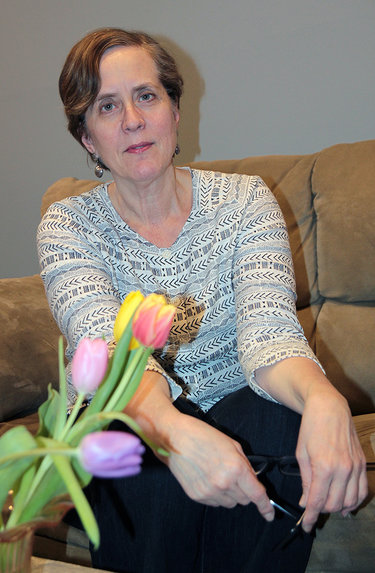Floyd Mair wins Social Change fellowship
Elizabeth Floyd Mair has won a Raise the Age reporting fellowship from The Chronicle of Social Change, an online news publication where several of her stories will be posted as well as published by The Enterprise this year.
The inaugural fellowship comes with a stipend of $2,700 and involves a series of conference calls in which Floyd Mair along with three other fellows in New York State — journalists from Watertown, Syracuse, and Ithaca — will hear from experts on juvenile justice and Raise the Age legislation.
The Chronicle bills itself as being “dedicated to solution-based news coverage of child welfare, juvenile justice, mental health and educational issues faced by vulnerable children.” It is published by the not-for-profit Fostering Media Connections, based in Los Angeles, California, and is supported by foundations, subscribers, and donors.
Floyd Mair became interested in New York’s Raise the Age legislation in 2017 when, as the Guilderland reporter for The Altamont Enterprise, she wrote about a Guilderland High School student with autism who, at 16, was treated very differently than his friend, who was 15 when they lodged false bomb threats at their school.
The 16-year-old, Nathan Agneta, was treated as an adult by the police and court system while the 15-year-old had his name withheld and had his case heard in Family Court. New York at that time was one of two states where 16- and 17-year-olds were treated as adults under the law.
The new law went into effect on Oct. 1, 2018, meaning 16-year-olds, in general, will no longer be charged or tried or held as adults. On Oct. 1 of this year, the law will apply to 17-year-olds too.
“I’m interested to find if there are unforeseen problems with this law still being hashed out,” said Floyd Mair.
Vita
Floyd Mair has a lifelong interest in language.
After graduating from Guilderland schools, where she had studied Spanish from the fourth-grade on, she earned a bachelor’s degree in philosophy, in 1983, from the State University of New York at Binghamton.
One of her favorite classes at Binghamton was a workshop in which students translated everything from Creole songs to African chants. “Spanish is warm, hot, outgoing, full of passionate emotion,” said Floyd Mair. By her senior year of college, she said, “I was ready for something different.” She studied Arabic.
For graduate school, she studied Japanese. “Japanese,” she explained, “is more inaccessible, more reserved. It’s different from American culture.”
Floyd Mair spent three years at the University of Iowa studying Japanese, for a master’s degree, along with two “intensive summers” at Indiana University, cramming five years of Japanese study into three. She then applied for and was admitted to the Ph.D. program in Japanese studies at the University of Toronto. In preparation, she traveled to Japan for a year of study at the Stanford Center in Yokohama.
Floyd Mair deferred her Ph.D., stayed in Japan, and never looked back. “I decided I didn’t want to write for other academics,” said Floyd Mair. “I wanted to write clearly for regular people. I didn’t want to write in a pretentious way.”
She got a job as a bank translator where she worked for five years and then worked for nine years for a publisher. “I learned how to edit books and make other people’s writing better,” said Floyd Mair.
When terrorists put poisonous gas on trains in Japan, people riding the trains broke with their usual countenance. “People would look at each other, making eye contact,” said Floyd Mair. “I suddenly felt more at home.”
Terrorism brought about a change for Floyd Mair, too.
She made a business trip to New York City in September 2001. “When 9/11 happened, I realized I didn’t want to read about things like this on the other side of the world,” said Floyd Mair. Also, her mother was ill with Parkinson’s disease so, after 15 years of living in Japan, Floyd Mair came home.
She lives now in the Guilderland home where she grew up, which she shares with her father, her husband, and their daughter.
“I wanted to learn to write better myself,” said Floyd Mair, having spent the bulk of her career editing others. In 2007, she began an eight-year stint as a freelance writer for the Albany Times Union, writing hundreds of author interviews, magazine articles, travel pieces, and commentaries. She also helped moderate a book club at the daily newspaper.
In 2015, she started her career at The Enterprise, first covering the villages of Altamont and Voorheesville and currently covering the town of Guilderland, winning several statewide awards for her work.
Referring to her 11-year-old daughter, Floyd Mair said, “Olivia calls me nosey. Being a journalist allows you to ask questions.”
She also said of her life-long love of language, “Knowing a language is a way to find out about people, being able to see into their lives.”



